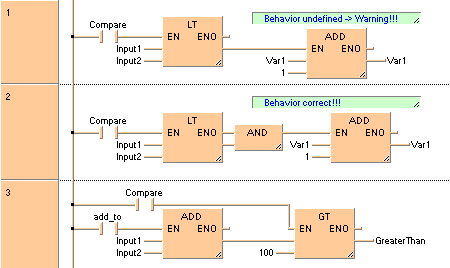The ENO status (TRUE or FALSE) of the first function (FUN) or the first function block (FB) determines whether it will be executed and whether its outputs will be written to or not (see EN/ENO for LD and FBD).
If a subsequent FUN or FB uses one of these outputs as an input, the compiler creates a temporary variable. Since other temporary variables can occupy this address, the value is undefined at this position if it has not been written to, i.e. if ENO is FALSE.
To avoid this, make sure all FUNs or FBs in a network are executed only if the previous FUN/FB has been executed, too. The compiler simply checks that the subsequent FUN or FB has no EN input and that an AND Function is not involved.

In Network 1, you will receive a warning because the behavior is undefined if Compare is FALSE.
Network 2 shows the correct programming and you receive no warning.
In Network 3, if Add_to is FALSE and Compare TRUE, the subsequent FUN (E_GT) is executed and the previous FUN (E_ADD) is not. Although the behavior is undefined, no warning message is issued by the compiler.